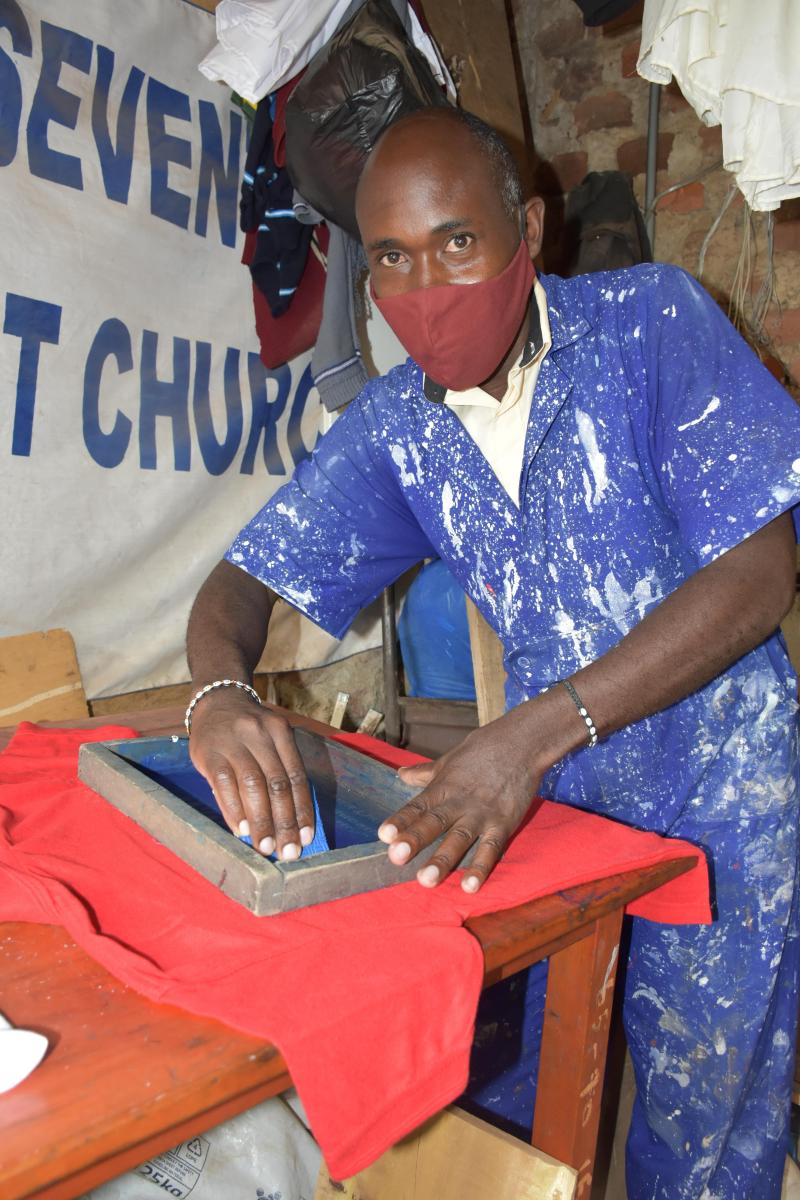Search
Viewing 2115 to 2130 of 3123 news
-

Le projet #TeamEurope-Niger fait un don de matériel à la région de Maradi
Halissa HASSAN DAN AZOUMI | 09/10/2020
TeamEurope est un projet financé par l’Union Européenne et le Grand-Duché de Luxembourg et mis en œuvre par Enabel.Ce projet vise la réduction de l’impact de la pandémie sur la population du Niger en se focalisant sur deux lignes essentielles du plan de riposte national : La fourniture en médicaments et autres consommables médicaux et le renforcement de 3 hôpitaux régionaux (Maradi, Dosso et Zinder) et de l’hôpital général de référence à Niamey en matériel de réanimation pour la prise en charge des patients en insuffisance respiratoire.Les structures sanitaires appuyées par le projet sont ainsi mieux équipées pour faire face à la prise en charge des patients atteints du Covid-19 et être plus résilients face à cette pandémie. Dans le cadre de la lutte contre la pandémie de Covid-19 et en réponse au plan de riposte national, le projet #TeamEurope-Niger a procédé le vendredi 11 septembre 2020 à une double cérémonie de donation de matériel à Maradi. La première cérémonie a consisté à la remise de 5000 masques réutilisables par EUCAP SAHEL aux Forces de Sécurité Intérieure (FSI). EUCAP SAHEL, en tant que mission européenne fait partie de l’équipe #TeamEurope-Niger et assure par ses vols, l’acheminement d’une partie du matériel acquis par le projet dans les régions. Au cours de la seconde cérémonie organisée au Centre Hospitalier Régional, ce sont, 50 masques Décathlon ; 1 électrolyseur ; 50 connecteurs (valves pour les masques décathlon) ; 15 oxymètres de pouls ; 25 pulvérisateurs ; 12 500 litres de solution hydroalcoolique ; 625 kg de chlore et 5000 masques réutilisables qui ont été remis.Ce matériel estimé à près de 57 millions de francs CFA contribuera à renforcer les capacités de l’hôpital de Maradi face à la lutte et à la résilience contre la Covid -19. Les deux cérémonies se sont déroulées en présence du Gouverneur de la région de Maradi, de l’Ambassadrice de la Délégation de l’Union Européenne, de la Représentante Résidente de l’Agence belge de développement (Enabel) au Niger et d’autres responsables de la région.
-
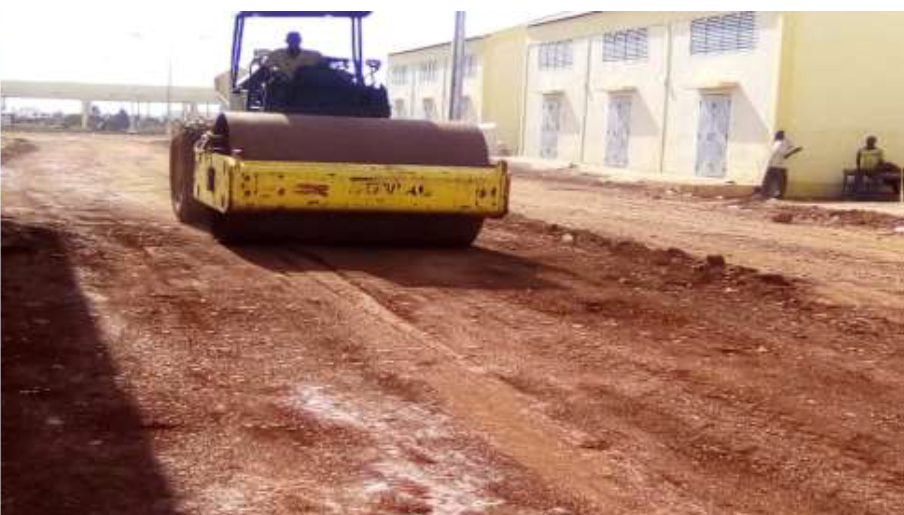
Travaux du nouveau port de pêche de Mopti - Mali
Nènè TRAORE | 08/10/2020
Après 3 mois d’exécution, les travaux de voiries du nouveau port de pêche de Mopti se poursuivent.Le niveau d’exécution est de 37%, en deçà du planning initial, dû aux précipitations exceptionnelles enregistrées en cette année 2020. Par ailleurs, suite à une troisième mission du Centre de Formation des Collectivités Territoriales (CFCT) à Mopti, les modalités pratiques de délégation de gestion des différentes infrastructures ont été définies.Les OPP de professionnels de la filière seront responsabilisées dans la gestion de plusieurs infrastructures.Par exemple, un groupement des trois organisations de mareyeuses (grossistes qui achètent sur place les produits de la pêche et les expédient aux marchands de poisson.) de la ville va ainsi assurer la gestion d’un hangar de réception et des espaces de commercialisation.Un groupement de commerçants de poisson fumé assurera la gestion d’un hangar de réception.
-
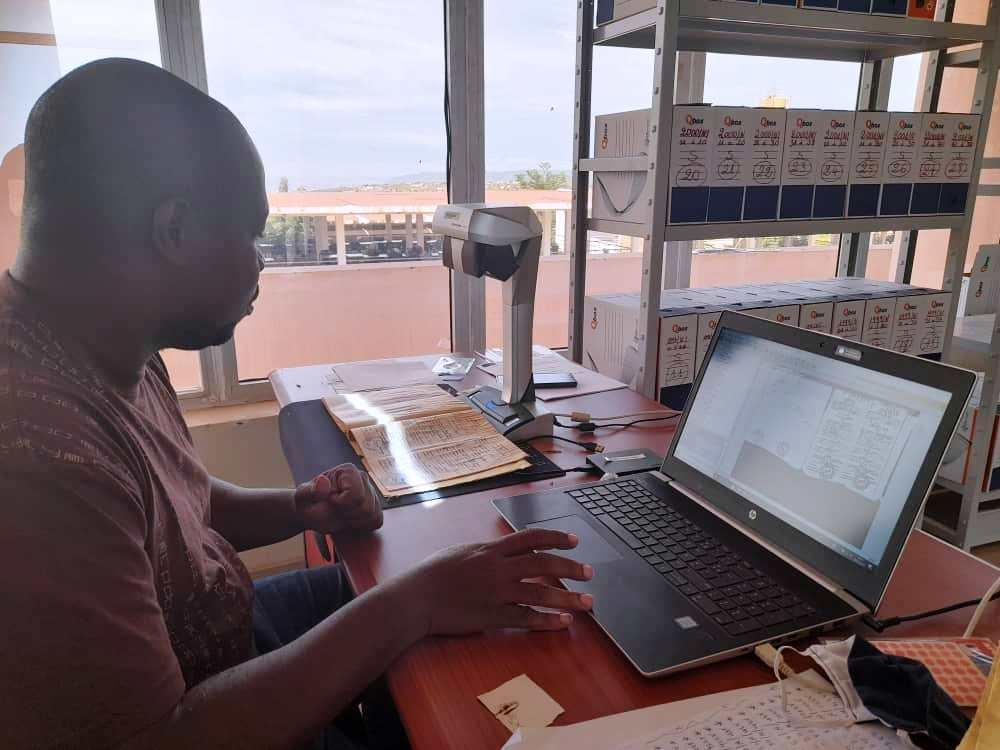
Mali: Vers la numérisation des registres et un plan national d’archivage
Nènè TRAORE | 08/10/2020
Au Mali, l’archivage et la conservation des registres sont de véritables défis. Les archives d’état civil se détériorent rapidement privant de nombreuses personnes de toute identité juridique objective. Pour répondre à ce constat, le projet PAECSIS a récemment démarré une opération pilote d’archivage des documents d’état civil au niveau de trois centres (Commune II de Bamako, centre principal de Sido, et centre spécial d’état civil de la Direction Nationale de l'Etat Civile). L’objectif est de définir et de tester, en vue d’un passage à l’échelle grandeur nature, la mise en œuvre d’un plan de numérisation des registres ainsi qu’un plan national d’archivage physique des documents d’état civil.
-

Mali: Les collectivités de la ville de Koulikoro en route vers la digitalisation
Nènè TRAORE | 08/10/2020
Dans le cadre du renforcement de capacité à l’intention des collectivités territoriales de la région de Koulikoro, Enabel a remis le10 septembre 2020, un lot de kits informatiques à la mairie de la commune urbaine de Koulikoro. Cette action s’inscrit dans le cadre la digitalisation du processus de la gestion des collectivités de la région. D’un coût total de 54. 682. 000 F CFA, cette première phase du projet de digitalisation des collectivités, concerne la mairie de la commune urbaine et le conseil régional de Koulikoro. En effet les auto-analyses organisationnelles réalisées par les collectivités territoriales de la région de Koulikoro ont démontré la faible capacité managériale sur la base de cartes de performances définies. C’est ainsi que ces collectivités territoriales ont retenu des actions prioritaires en matière de digitalisation. Parmi ces actions prioritaires figurent le développement de compétences en gestion électronique des archives d’une part et d’autre part, la mise en place et le développement d’une plateforme numérique répondant à des besoins en gestion administrative des collectivités territoriales. La priorité a été donnée au renforcement des capacités sur les techniques de classement et d’archivage au profit des secrétaires, secrétaires généraux des collectivités territoriales. Cela devra se traduire par la formation et l’accompagnement en matière d’archivage électronique mais aussi la mise en place d’un dispositif approprié d’archivage et formation des utilisateurs. Dans les jours à venir une formation est attendue pour une meilleure maitrise du dispositif par les agents. Selon le secrétaire général de la mairie, la digitalisation vient pallier de façon diligente les exigences de la population : « avant pour retrouver certains papiers c’était des problèmes au niveau de la marie, surtout au moment des audits c’était un véritable casse-tête car il faudra faire descendre tous les dossiers et chercher un par un ce qui joue beaucoup sur notre productivité. Avec la digitalisation nous serons épargnés de tout cela et nous pourrons répondre de façon efficace et efficiente aux besoins exprimés par la population » a-t-il signalé. Le processus de digitalisation viendra sans doute palier d’énormes difficultés auxquelles la mairie est confrontée en matière de gestion et facilitera également la communication avec les services extérieurs selon plusieurs agents de la mairie. A entendre la cheffe de section de l’état civil de la mairie, la digitalisation est plus que bienvenue pour eux : « les problèmes de la section de l’état civil se trouvent au niveau de l’enregistrement des naissances. On enregistre les naissances sur les registres en 3 volets. Un registre fait 50 feuilles. Si on multiplie cela par 3, ça fait 150 feuilles. Et dans le mois on se retrouve souvent avec 4 à 5 registres à remplir, c’est un travail énorme pour nous.» signale-t-elle.
-

Call for Experts: Socieux + is looking for expertise!
Rudi POULUSSEN | 07/10/2020
CAMBODIA: Specific objectives SO1. To increase GS NSPC staff’s and relevant stakeholders’ understanding about social protection for people with disabilities as they are conceived and implemented in different countries SO2. GS NSPC staff and relevant stakeholders are in capacity to draft a comprehensive national social protection scheme for people with disabilities Expected results Policy options for establishing a social protection scheme for people with disabilities are outlined by the GS NSCP’s staff with the participation of relevant stakeholders Final deliverables A compendium of policies and measures (assessment, benefits, health, education, vocational training and employment promotion, etc.) in the area of social protection of people with disabilities.Mapping of the current services and programs dedicated to people with disabilities, provided by different national and international stakeholders in Cambodia.A brief assessment of the extent of social protection coverage of people with disabilities in Cambodia, and eventual gaps in terms of targeting, adequacy, assessment and identification, enrolment.The main components of a biannual Action Plan for social protection of people with disabilities for the GS NSPC Social Assistance Department.Ref.: 20-09/KHM/2 Deadline for applications: 30/10/2020http://socieux.eu/wp-content/uploads/2020/09/2020-09-KHM_Act2-ToREx_2020-09-22.pdf MAURITANIA : Objectifs spécifiquesS1 : Élaborer un parcours de formation idoine pour la création d’entreprises adapté aux besoins des jeunes demandeurs d’emploi des deux sexes ayant un projet de création d’entreprise, en ligne avec les enjeux économiques, sociaux et environnementaux du pays (Stratégie Nationale de l’Emploi, SNE) et en complémentarité avec les interventions de la coopération bilatérale et multilatérale (BIT et AFD, etc.). S2 : Développer une démarche d’ingénierie de la formation – analyse, conception, réalisation et évaluation - axée sur le développement des compétences transversales (soft skills) afin d’accentuer les chances de réussite des jeunes entrepreneurs/neuses ; S3 : Pérenniser le parcours de formation destiné à la promotion de l’entreprenariat et de l’esprit d’entreprise par le biais du renforcement des capacités des formateurs (Job développeur).Résultats attendus R1 : Un parcours de formation modulaire axé sur les compétences transversales, destiné aux jeunes demandeurs d’emploi des deux sexes ayant un projet de création d’entreprise à n’importe quel stade d’avancement est élaboré.R2 : Une démarche en ingénierie de la formation axée sur les compétences transversales (soft skills) est formulée.R3 : Des structures publiques et associatives impliquées auprès des jeunes entrepreneurs /euses, sont formées à la promotion de l’entreprenariat pour les jeunes demandeurs d’emploi et sont en mesures d’identifier et valoriser les compétences transversales. Livrables finaux attendus La feuille de route pour un parcours de formation de futurs jeunes entrepreneurs/euses axé sur l’identification et la valorisation des compétences transversales, avec un plan de formation de formateurs.Le matériel pédagogique de formation de formateurs axé sur les compétences transversales. Les modules de formation destinésRéf.: 20-08/MRT/1 Date limite de candidature : 18-10-2020 http://socieux.eu/wp-content/uploads/2020/09/2020-08_MRT_act1_ToREx_2020-09-24-1.pdf TANZANIA : Specific objectives SO1. Critically review the existing draft of Workers Compensation Fund (WCF) rehabilitation strategy. SO2. Conduct a tripartite social dialogue (involving the WCF, the Unions’ Commission and the Employers’ Association) to get a mutual understanding of a rehabilitation strategy for victims of accidents and work-related sickness. S03. Finalize and adopt a WCF rehabilitation strategy. Expected results ER1. A dialogue between the WCF, the Unions’ Commission and the Employers’ Association in view to get a mutual understanding on the main principles and actual components of a rehabilitation strategy for victims of accidents and work-related sickness, is set-up and steered. ER2. The final draft of a WCF rehabilitation strategy is achieved and adopted by the WCF. Final deliverables A brief note assessing the actual draft WCF rehabilitation strategy, which helps identifying problematic issues, as well as components that shall be included in a rehabilitation strategy.A WCF rehabilitation strategy paper.Ref. : 19-35/TNZ/2 Deadline for applications: 30/10/2020 http://socieux.eu/wp-content/uploads/2020/09/2019-35-TNZ_ToREx-Act2_2020-09-18.pdf For more information see: http://socieux.eu/join-us/experts/
-
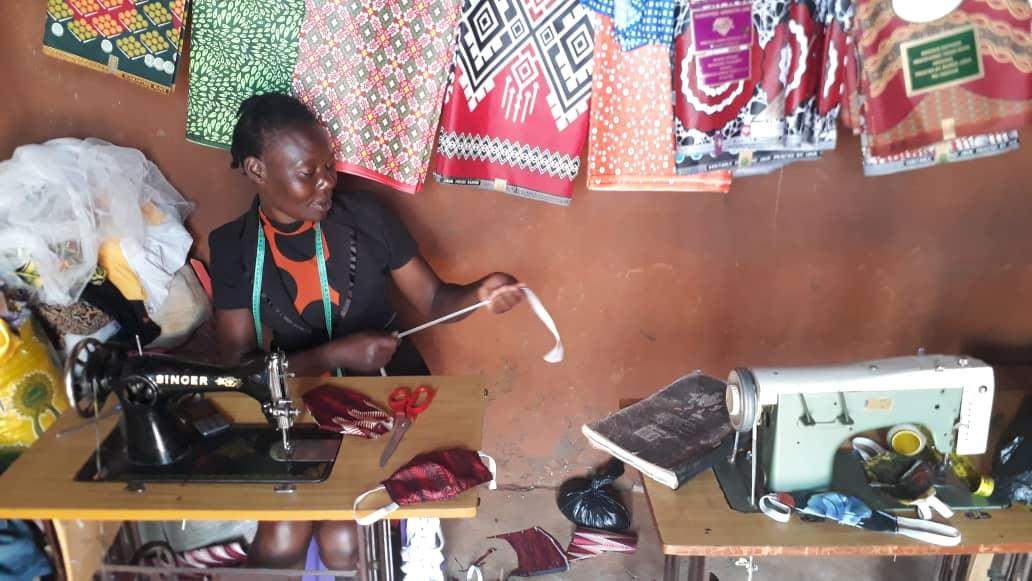
In Uganda, innovation helped students survive during Covid lockdown
Racheal AKELLO | 06/10/2020
They had just received their biggest order ever. In February 2020, they won a contract to make 500 uniforms for pupils of Kisumu Primary School. But then Covid-19 struck. Schools and businesses were closed. Public and private transport were banned and a 7 pm curfew was introduced. For Juliet Aigo and Rose Akello, who run a tailoring shop in Uganda’s northeastern region of Karamoja, it was like a dream was shattered. They had worked hard to reach where they had. In this remote region, where child marriage and poverty are widespread, the two girls took an extraordinary step. They left the village to enroll in a training course in Moroto town, some 100 km away. The six-month course in tailoring and fashion design at Daniel Comboni Vocation Institute was part of a skills training programme, run by Enabel.After graduation, the two friends bought a sewing machine on credit and opened a tailoring workshop in the trading centre of Nakiripirit. As the business took off and more orders came in, they were able to pay off their sewing machine and buy two more. The uniform contract was going to be a huge boost for their infant business. “This was one of the biggest orders in three years. But as soon as we had started the work, the government announced a lockdown,” says Juliet. Not only was it a major setback for their business, the girls suddenly found themselves struggling to survive and slipping back into the poverty trap they had tried hard to escape. The course, however, had taught them to think out of the box, be innovative, and adapt to changing situations. When the use of masks in public places became mandatory, they saw it as an opportunity. They took their sewing machines home, to the village of Acerere, and started making face masks, which they sold at UGX 1,000 each. And since people in the village had no money for new clothes, the tailors made patching and repairing old clothes their new trademark. “It was business as usual and we survived better than most businesses during the lockdown,” says Rose. “On a good day, we made up to UGX 8,000.” They also turned to farming. On Julie’s family land, they produced their own sorghum and sold the surplus. That helped them acquire additional sewing machines and expand their workshop. Despite the setback caused by the Covid-19 epidemic, they not only managed to keep their business going but also to continue dreaming. “One day, we want to turn our workshop into a public training centre for fashion designers,” says Rose.
-
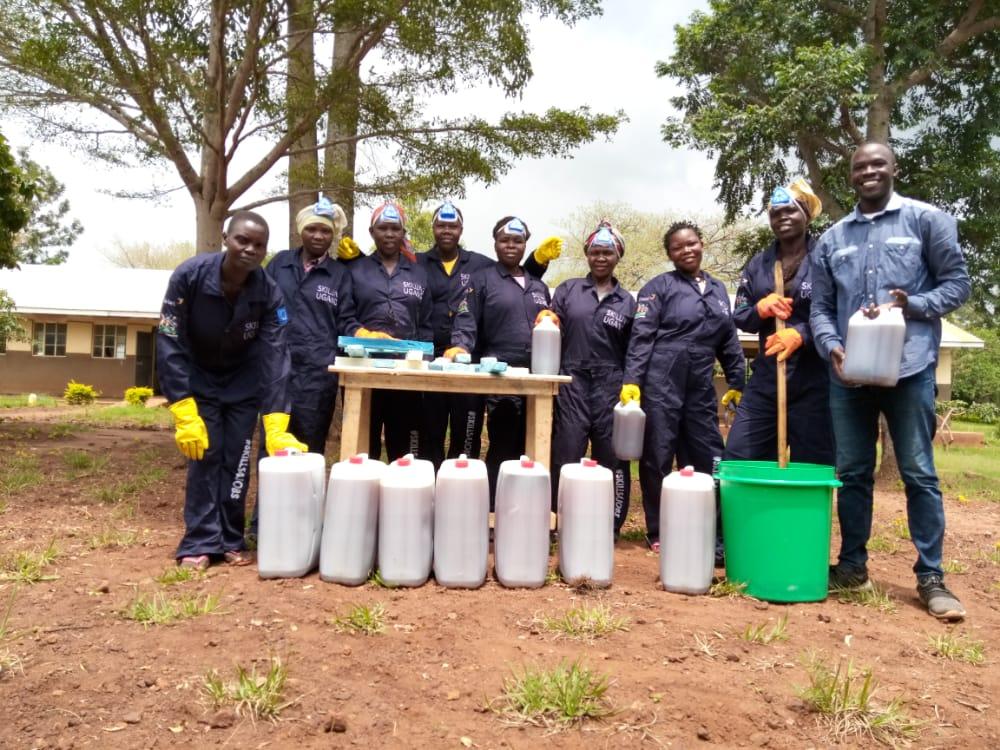
350 more Refugees & Host Communities trainees get skills training in West Nile - Uganda
Racheal AKELLO | 06/10/2020
Another 350 young people in Uganda’s West Nile region have enrolled in short term skills training courses organized by the Belgian development agency Enabel. This brings to 2,550 the total number of youth, both Ugandans and South Sudanese refugees, who have benefited from the programme in the last four years. The new batch of students, based in the districts of Arua and Yumbe, are trained in bakery, shoemaking and soap making, which are marketable enterprises in the area. “The courses last between 10 and 100 hours,” says Enabel’s training manager, Robert Kisoma. “At the end of the training, the beneficiaries receive a start-up kit to enable them start a business.” Bakery students are given a frying pan and a bag of wheat flour. Students in shoemaking get sowing needles and a shoe frame, while those in soap making receive a mold, a weighing scale and a bucket. The project, funded by the European Union Emergency Trust Fund (EUTF), aims to contribute to the peaceful co-existence of host and refugee communities. The region hosts over one million refugees. It also aims to address youth unemployment and poverty in West Nile – the second poorest region in Uganda, according to the World Bank. Indeed, a 2015 baseline study found that 71 percent of the youth in the region lived in extreme poverty, while an estimated 31 percent was unemployed. One of them was Jackson Eneku, a 23-year old Ugandan resident of Arua. Since he dropped out of secondary school, he had no way of making ends meet. Eneku was selected to participate in the bakery training and received the start-up kit. Now he is earning on average UGX30,000 a week from the sale of his locally baked bread. In the neighbouring district of Adjumani, Betty Doru, a 24-year old South Sudanese refugee who completed the same course, started a bakery with some fellow students. “With the sale of our bread, we have set up a saving scheme. Members can borrow money from the scheme to support their families,” she says. Kenneth Kaunda, Enabel’s Skills Development Director, says after the training, most beneficiaries either become self-employed or find a job. The majority see their income increase significantly. Research conducted by Enabel found that 80 percent of beneficiaries saw their earnings rise by at least 50 percent.
-
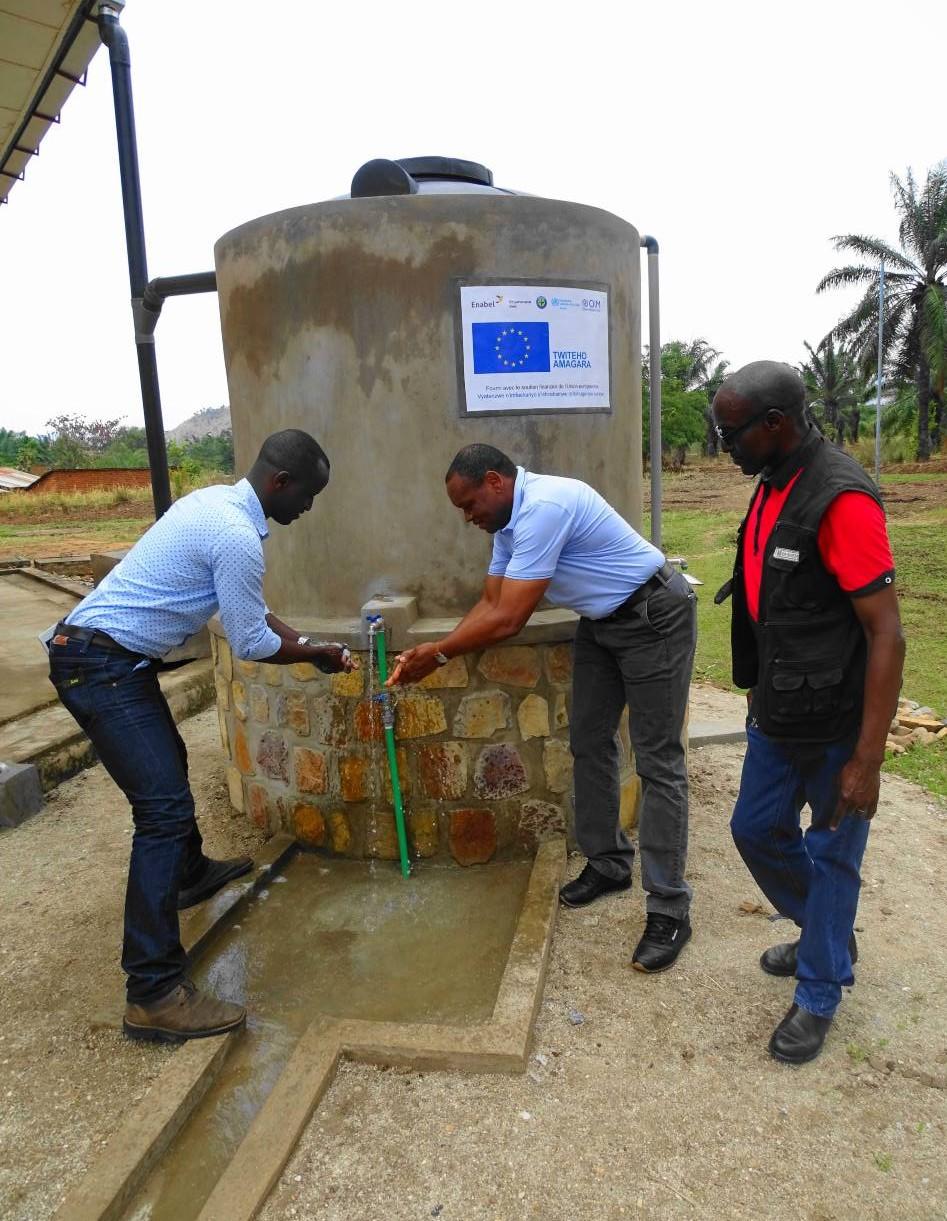
Les systèmes de collecte d’eaux pluviales, un enjeu important pour l’amélioration de l’hygiène en contexte de Covid-19
Carla MORVAN | 06/10/2020
Les infections liées aux soins de santé dans les FOSA (Formations Sanitaires) sont une cause importante de morbidité et de mortalité et entraînent une perte de ressources pour le secteur de la santé et une baisse de revenu des ménages à l’échelle mondiale. L’OMS estime qu’entre 5 et 30 % des patients hospitalisés contractent une ou plusieurs infections dont une grande partie pourrait parfaitement être évitée*. Ce constat est aujourd’hui amplifié par la pandémie de Covid-19 dont la prévention de l’infection nécessite des mesures d'hygiéne strictes.Au Burundi, certaines structures de santé n’ont pas accès à l’eau courante ce qui augmente le risque d'apparition des infections nosocomiales (maladies contractées dans un établissement de santé). Notons que le pays possède un climat tropical, avec une saison des pluies s’étendant de septembre à juin. La collecte des eaux pluviales est une technique qui permet d’alimenter les centres de santé en eau presque sur la totalité de l’année et ainsi renforcer l’hygiène dans le cadre de la stratégie de prévention et contrôle de l’infection (PCI) menée par le MSPLS.Dans le cadre de ses activités pour la mise en œuvre du Programme Résilience – Twiteho Amagara, Enabel appuie la construction de systèmes de collecte d’eaux pluviales au niveau de dix-sept centres de santé (CDS) basés dans les Provinces de Rumonge et Bujumbura. Jusqu’alors, aucun dispositif permettant un accès à l’eau au niveau de ces CDS n’avait été mis en place. La mise en place d’un système de collecte d’eaux pluviales (SCEP) permettra un gain de temps considérable pour les gardes malades qui n’auront plus à se rendre à plusieurs centaines de mètres voire kilomètres pour s’approvisionner en eau. Une amélioration considérable de l’hygiène des locaux est également attendue. Il s’agit d’un élément non négligeable dans la lutte contre les infections liées aux soins de santé, en particulier dans la prévention de la pandémie de Covid-19. Par ailleurs, le personnel des CDS, sera plus disponible pour les patient.e.s. Le système de collecte d’eaux pluviales permettra des économies budgétaires non négligeables pour les FOSA qui faisaient appel jusqu’à présent à des prestataires externes pour acheminer l’eau. Cette activité contribuera également à la réduction des inégalités de genre dans la mesure où il a été observé que les gardes malades sont en grande majorité les filles, les sœurs ou les mères des patient.e.s. Enfin, cette activité concoure à la protection de l’environnement notamment car la collecte de l’eau pluviale réduit la quantité d’eau ruisselante. Cette eau ruisselante est problématique à plusieurs niveaux. En effet, l’eau emporte sur son passage les déchets ce qui contamine les ruisseaux, les rivières et les lacs. De plus l’eau de ruissellement emporte également les fumiers épandus dans les champs et les espaces non mis en valeur engendrant un appauvrissement de sols ce qui diminue la productivité agricole. *Source : Normes essentielles en matière de santé environnementale dans les structures de soins – OMS – J. Adams, J. Bartram, Y. Chartier
-
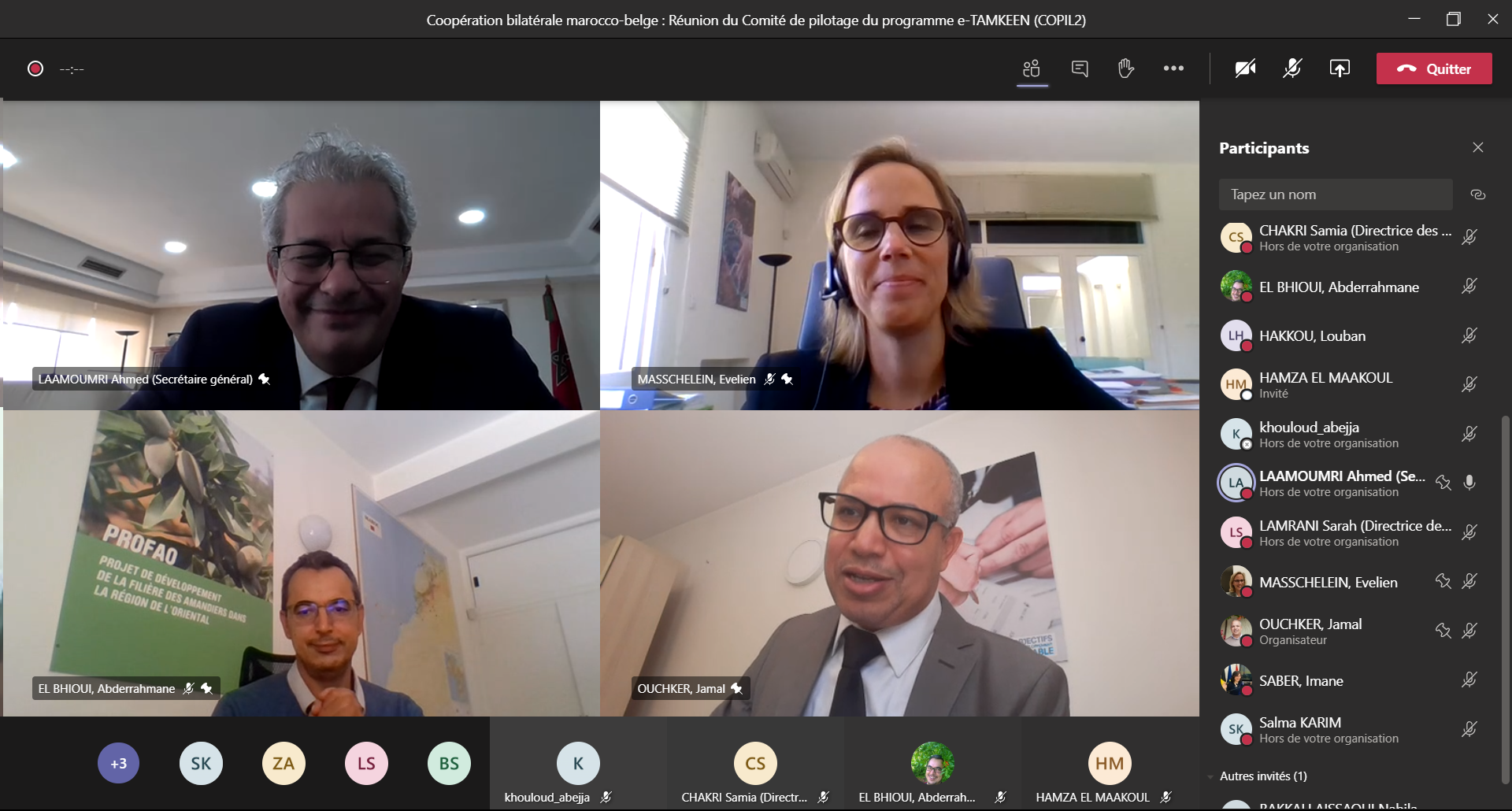
Réunion du 2ème comité de pilotage du programme e-TAMKEEN - Maroc
Bassam ALAOUI MDAGHRI | 01/10/2020
Le 1er Octobre 2020, le programme e-TAMKEEN de renforcement des compétences des fonctionnaires femmes et hommes au niveau central et local en matière de digitalisation, a tenu son deuxième Comité de Pilotage par vidéo conférence.La rencontre a regroupé des représentants d'Enabel, du Département de la Réforme de l'Administration, de l'Agence de développement du Digital (ADD), de l'Ecole Nationale Supérieure de l'Administration (ENSA) et de la Direction du Budget relevant du Ministère de l'Economie, des Finances et de la Réforme de l'Administration (MEFRA). Les discussions étaient centrées principalement sur la présentation de l'état d'avancement du programme et sur la validation des chantiers du prochain trimestre.
-
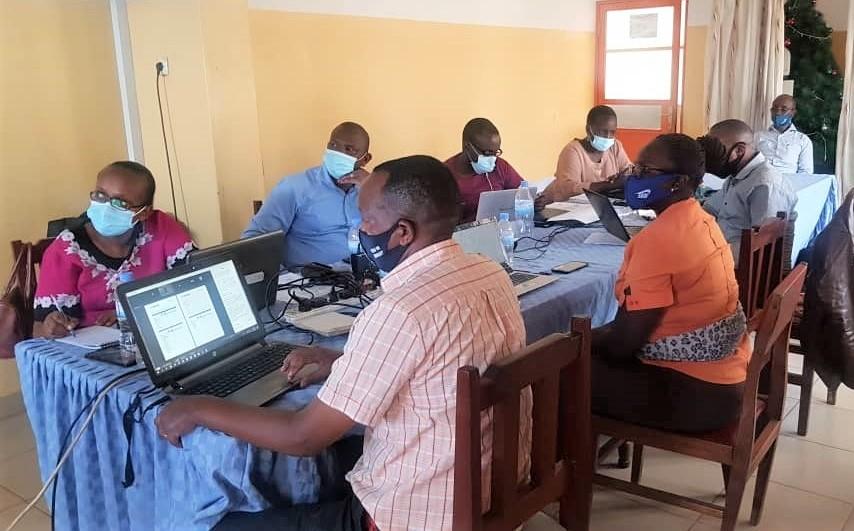
Pig and poultry farmers to acquire more competences on value chains - Rwanda
Denise NSANGA | 30/09/2020
An online training was organized by Rwanda Agriculture Board (RAB) in collaboration with Enabel, for Livestock Farmer Field School Master Trainers on poultry (broilers, layers, dual purpose) and pig value chains with eventual capacity building of commercial small & large farmers on how to run farm business as an enterprise. The training is being delivered by Vetworks, a Belgian based consulting firm, which will share with trainees not only relevant innovations and experience but also designing, organizing and conducting Livestock Farmer Field School (L-FFS) training. The 10-day session will provide 14 trainees from RAB and the Private Sector operators with competences to train other 100 L-FFS facilitators on poultry and pig production techniques and entrepreneurship in 10 selected districts of project intervention.
-

In Rwanda, Belgium provides the Ministry of Health with 40 ambulances to support health sector
Denise NSANGA | 29/09/2020
The Kingdom of Belgium, on September 24, 2020 handed over 40 ambulances to the Ministry of Health of Rwanda to boost access to health services. The forty ambulances worth around Rwf2 billion will be dispatched in district hospitals throughout the country and aim to strengthen the health system and reach Rwanda’s target of 1 ambulance per 40.000 inhabitants by 2024, for better service delivery. Speaking at the event, Ambassador of Belgium to Rwanda Benoit Ryelandt said that the donation of ambulances was planned as part of the current Belgo-Rwandan cooperation in the health sector. “The Health sector is one of the components of the current 5-year Belgo-Rwandan cooperation 2019-2024. The 40 ambulances were planned to be delivered throughout the project but with COVID19 pandemic, it is even more useful to deliver all the ambulances now and at the same time to help contain the spread of the virus as well as other contagious diseases” said HE Benoit Ryelandt, Ambassador of Belgium in Rwanda. The Minister of Health, Dr. Daniel NGAMIJE said that the new ambulances will contribute to improve access to health care and service delivery to reduce deaths and reach the universal health coverage. He said: “The support of 40 ambulances to our health sector contributes to the attainment of the Government of the Rwanda National Strategy in the context of Epidemics response such as ebola virus desease and COVID19 pandemics to mention but a few.” The health sector is focusing on Maternal and Child Health, Sexual and Reproductive Health, including Family Planning, and Household access to health care. It covers 40% of the total envelope, i.e 45 million Euros.
-
In Uganda, an advert for a skills training programme changed Koojo’s life
Racheal AKELLO | 28/09/2020
Along Balya Road in Fort Portal, a town in western Uganda on the foothills of the Rwenzori Mountains, there is a small but busy graphic design shop, called Kabarole Red Enterprises. The owner and manager, John Koojo, proudly shows his equipment for making tie-dye embroidery and printing banners, signposts and labels. On display are screen printing machines, printing films, computers, T-shirts, fabric ink and dye. In less than 3 years, Koojo, aged 38, has made a name for himself. The demand for branded goods and customised T-shirts is high in this fast-growing town. Among his customers are schools, churches, cooperatives and businesses. He owes his success to an advert he came across in 2017. A graphic design teacher at Rosa Mystica Institute offered a six-month course to whoever was interested. The course was funded by the Belgian development agency as part of a skills training programme, aimed at addressing the huge problem of youth unemployment in Uganda. Although Koojo had studied Arts and Design at the university some 20 years earlier, he lacked the practical experience. Indeed, the university did not have any of the tools and machines needed in the present-day labour market. Failing to find a job after graduating from university, Koojo had worked for many years at his uncle’s tailoring workshop. The training course changed everything. His art and graphics skills greatly improved and with the sale of his first customised T-shirts, he was able to open a shop in the town’s business centre. Now he earns about 1.5 million shillings a month. With that money, he has been able to buy land, construct and furnish a house and send his three children to school. Koojo is also passing on his skills to other youth in Fort Portal. He trains them for three to five months and charges 500,000 shillings for the entire course. ‘If they wish to stay and work for me, they are allowed and they earn a commission on items sold and clients brought,’ he said. Isaiah Buttuura, an IT student from Makerere University, is one of his apprentices. Buttuura used the three-month lockdown, introduced by the Government to fight COVID-19, to get the practical skills needed to start up his own business. “The training has helped me to acquire skills. I was also able to earn some money which kept me going during the lockdown,” he said. Koojo's long-term dream is to transform his workshop into a quality training centre for unemployed youth. “Let young people get hands-on training. Skills development gives them a better chance to be job creators, rather than job seekers,” he said. The Skills Development Fund of the Belgian development agency has so far benefitted 2,450 young people in the Albertine-Rwenzori region.
-
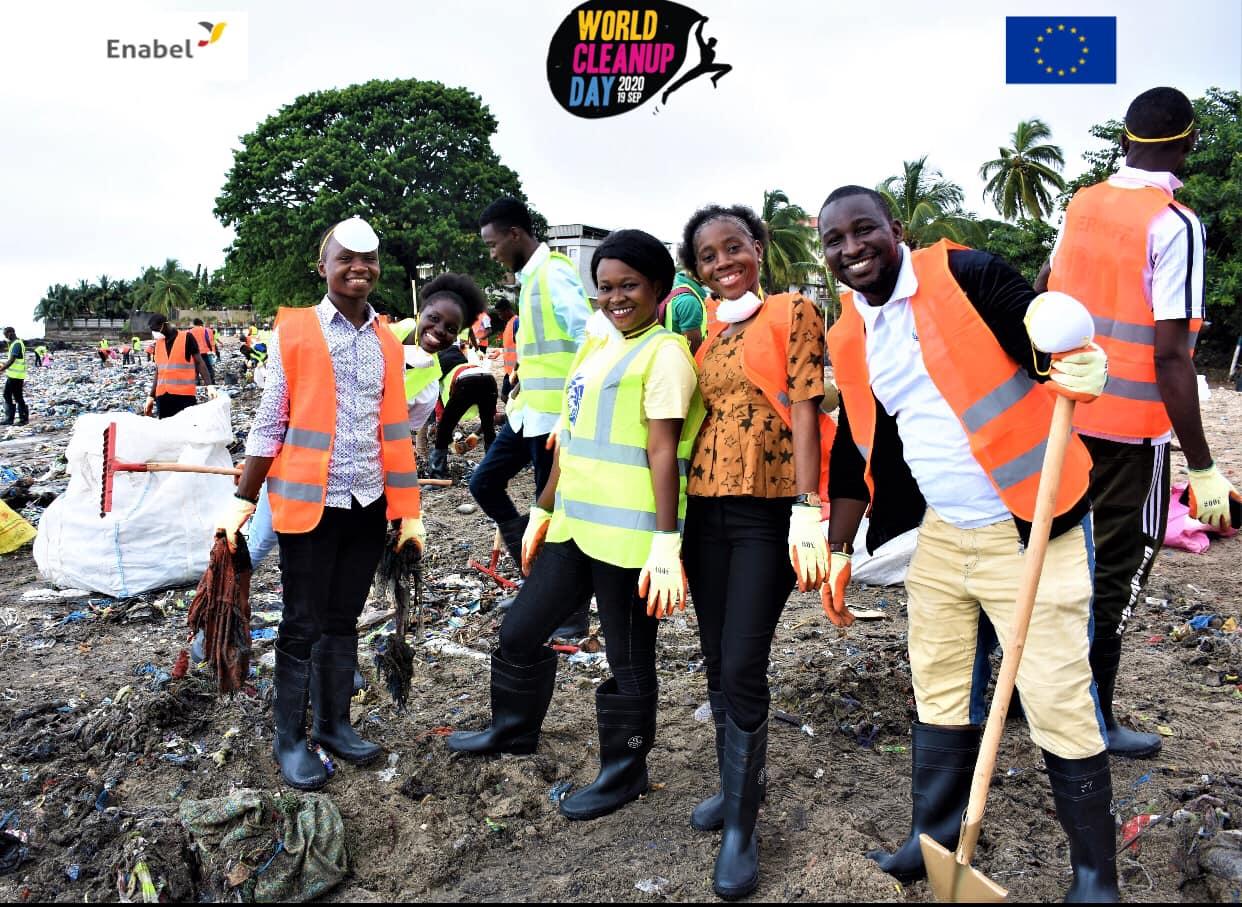
World Clean Up Day en Guinée : Sanita villes propres collabore avec les partenaires locaux
Djene Deen KOUYATE | 25/09/2020
La journée internationale de l'assainissement #Worldcleanupday est une occasion exceptionnelle de mener des actions citoyennes d'assainissement. Le World Clean up Day est la plus grande action civique au cours d'une journée, des milliers de bénévoles et des partenaires du monde entier dans plus de 150 pays, se réunissent pour nettoyer le monde et débarrasser notre planète des déchets, nettoyer nos plages, rivières, forêts et rues.Sanita villes propres, un projet exécuté par Enabel sur financement de l'Union européenne, se joint depuis 2019 à cette célébration en accompagnant des bénévoles et des partenaires guinéens à l'initiative d'assainissement des lieux publics avec l'implication de différentes structures actives dans le secteur pour une meilleure gestion pérenne des déchets.Sanita villes propres appuiera tout ce mois de septembre ces initiatives bénévoles pour le World Clean Up Day, en nettoyant avec les autorités, les jeunes et la population environnante, les ONGs évoluant dans les zones abritants les nouvelles zones de transit et de tri.Grâce à ces actions, les populations environnantes pourront (re) vivre dans un quartier assaini et sans pollution; et elles s'engageront à les garder propres en gérant de manière adéquate leurs déchets et/ou en s'abonnant à un ystème professionnel de collecte de déchets.L'assainissement est la responsabilité de tous.
-
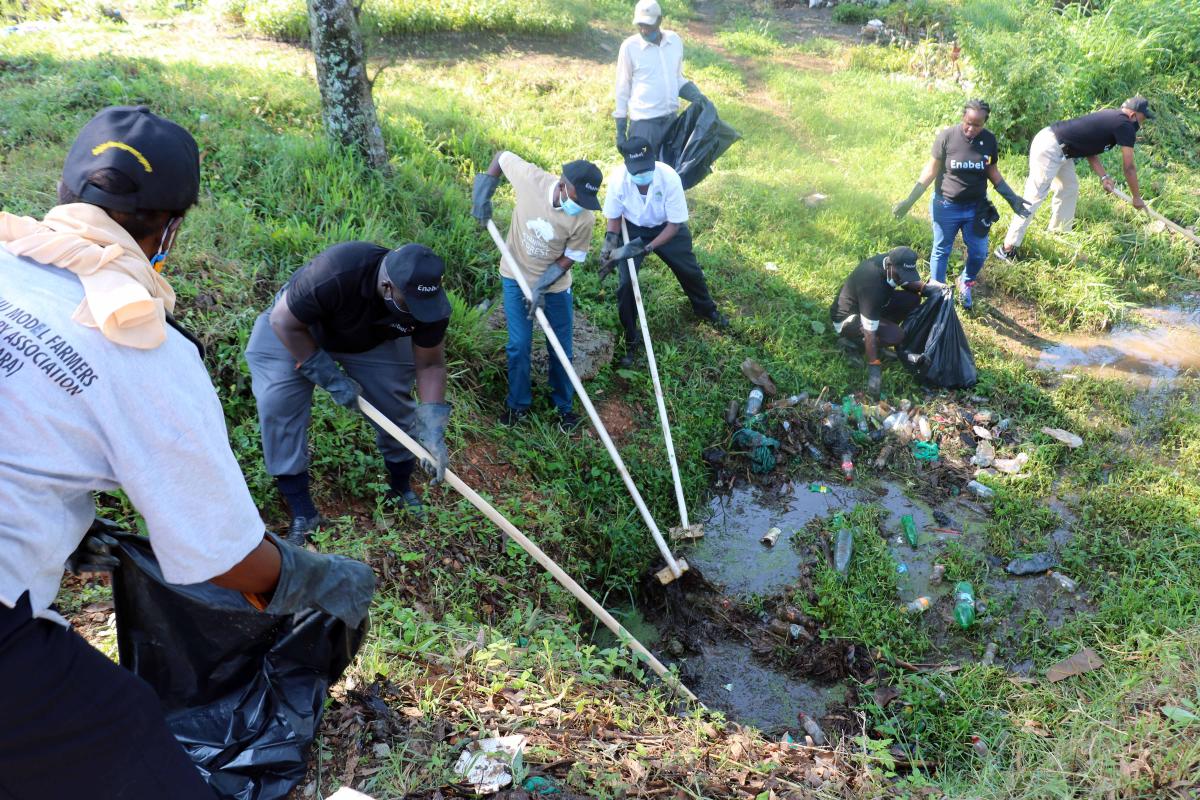
Word Cleanup Day: In Uganda, Fort portal residents adopt proper waste disposal
William YEKA | 22/09/2020
Fort Portal residents have been urged to desist from littering to safeguard the town’s image as Uganda’s Tourism City. Home to several tourism sites, Fort Portal is one of the 7 municipalities recently upgraded to cities. Speaking during cleanup day commemoration in Fort Portal town today, Enabel Resident Representative Christelle Jocquet said the district is the face of Uganda so should continue to look as such. “Littering is a major public health and environmental threat the world is battling today,” Jocquet said. “Rubbish and pollution is a growing problem in most cities, towns and communities.” Jocquet said improper waste disposal especially during this rain season could result in deadly illnesses such as Cholera. Uganda, she says can’t let this happen during these already dire times of the coronavirus disease. While government may have laws in place, Jocquet says everyone should make it a personal responsibility to keep the environment litter free. “Everyone desires to live in a clean environment since inaction affects you as an individuals as well as the larger community. It should therefore be the responsibility of each one to ensure he or she dumps waste in places designated for the purpose and this should be taught right from home,” she says. She commended the ban of the use of polythene bags commonly known as “kaveeras” saying it was a good step towards conserving the environment for future generations. “While the decision should be commended, there is a laxity in implementation since we still find kaveeras littered implying they are in use.” Jocquet said. World Cleanup Day is a global social civic action day commemorated yearly to discourage improper solid waste disposal. 80% of waste floating on water bodies is said to be mismanaged waste, posing a serious danger to human and aquatic life.
-

Utilisation de drones pour une agriculture climato-intelligente au Bénin
Reece-hermine ADANWENON | 18/09/2020
En collaboration avec des partenaires locaux, Enabel et la société TechnoServe développent des analyses par drone et d'images satellites pour améliorer les données sur la production de la noix de cajou au Bénin et les traduire en outils pour l'appui aux producteurs.Cette analyse aide à améliorer la compréhension du rendement et des changements dans l'utilisation des terres pour la production de noix de cajou et permet d’orienter les producteurs vers des conseils sur les pratiques agricoles intelligentes face aux enjeux climatiques. Un projet innovant partenaire du programme Wehubit d'Enabel.
